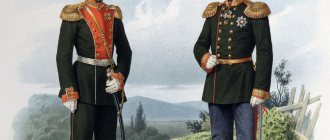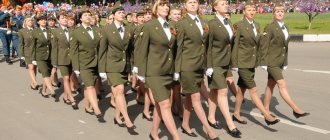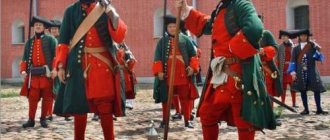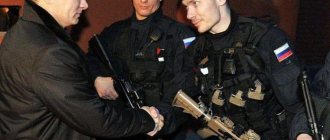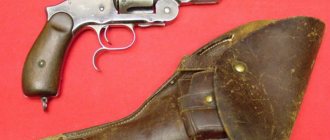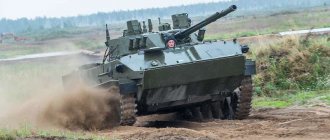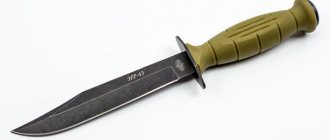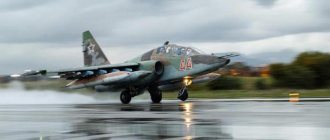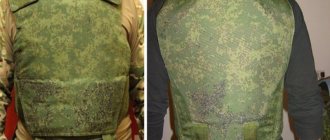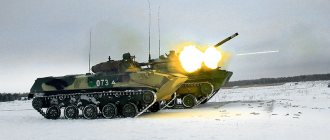In the army community, as in any social structure, there is a certain hierarchy of non-statutory order. It implies a clear distinction between military personnel undergoing military service into groups according to their length of service. Due to the fact that the service life was reduced to 1 year, non-statutory ranks were modified, but not abolished. The only difference is that now the entire cycle of passage from “spirit” to “grandfather” takes place in an express version. Let's take a closer look at how this happens.
Smell
After a soldier has been selected at a distribution point, he is sent either to a training unit or to a military unit, but to a separate company for quarantine, where he undergoes training.
Arriving at the place, yesterday's conscript becomes a “smell.” This title will be assigned to him until he takes the oath.
Quarantine ends no later than two months of military service. What does this title mean? The explanation is very simple, yesterday’s conscripts are not soldiers yet, they are just the smells of soldiers. At this time, the “smells” and “demobilization” are similar. These military ranks have one foot in civilian life. While in the unit, many people mistakenly think that they automatically become “spirits,” but this is not so; they still need to achieve this title.
Uniform and shoulder straps
The difference between the shoulder straps worn by servicemen of different army structures lies both in their own color and in the shade of the stripes located on them. In addition, the placement of distinctive insignia on shoulder straps also depends on belonging to a particular army structure. Military uniforms come in dress, casual and field uniforms; each set has its own type of shoulder strap. The everyday version of the uniform for warrant officers, sergeants and enlisted personnel includes shoulder straps, the edges of the longitudinal part of which end in narrow stripes.
Uniform shoulder straps for everyday use by junior officers have one longitudinal stripe located in the center of the shoulder strap, while senior officers have two stripes located similarly. Everyday shoulder straps of senior officers are decorated with a special fabric relief, and the edges are framed by one thin strip. The stars on them are attached only in one row. Marshall epaulettes also differ in color. If ordinary officers' shoulder straps are dark green, then those of marshals are painted gold.
For non-officer field uniforms, shoulder straps are provided in the form of a regular rectangle made of fabric camouflaged to look like taiga. The uniform of junior officers includes shoulder straps with smaller stars, senior officers - large ones, located in one row.
Higher command personnel wear dark green stars on the shoulder straps of their field uniforms; army generals and Marshals of the Russian Federation have larger stars.
Spirit
After taking the oath, when the private already has the right to bear arms and is assigned other statutory duties, he is awarded the rank of “spirit”. He will serve in this honorary title for up to 100 days of service. During this period, he learns all the delights of army service. Outfits every other day, cleaning and PCB, this is what the service of a private in this rank consists of.
Cleaning is a separate army ritual. The spirits learn the art of putting things in order in the barracks with special care, but they also acquire such a necessary skill for life as keeping the room in which you live clean.
Military personnel in this rank have absolutely no rights, and the requirements for them are increased. Especially when it comes to personal hygiene. If the unit is in a location and not at a field exit, then the soldier must be shaved, his shoes must be shiny, and his head must be neatly trimmed. This is very strictly enforced, and those who do not comply with these requirements are treated with special disdain.
Find out: Comparison of the Russian army with the US army for 2022
At this time, special attention is paid to memorizing the charter. A soldier must know this set of rules by heart. Therefore, learning the rules for “spirits” is a common activity. At this time, it is better for young soldiers to stick together, then it will be easier to survive it.
Rebellious
It is clear that if a person is mocked for a long time and in a sophisticated way, he can lose his human appearance.
So, in February 1987, private Arturas (Arthur) Sakalauskas shot several people with a service weapon stolen from his superiors. These few people, it seems, did everything to arouse the soldier’s uncontrollable hatred towards themselves: they poured hot soup on his head, mixed half a glass of salt and sand into his food, dunked his head in the toilet (they tore his ear in the process), did not allow him to sleep for a long time, tried to rape. One can only ask oneself: how many soldiers endured the same thing in silence?
Elephant
After completing 100 days of service, a new period begins in the life of a soldier. From the category of incorporeal “spirits”, he moves to the title of “elephant”. The rank of elephant in the army gives the right to burden a soldier with all sorts of assignments.
Household work in the army is the basis of service. Most of the time he spends his time doing some very important work:
- clears snow on the territory of the unit;
- sweeps the area in the warm season;
- pits are dripping.
Elephants are hardy animals, so the title “elephant” implies that you will have to carry a lot. There is a certain ritual in which the demobilizer hits the future elephant on the soft spot with a soldier’s belt 3 times, symbolizing 3 months of service.
This title is held by a soldier for 100 to 160 days. Depending on the time of conscription, a moment comes when all the old-timers retire. At this time, a private from the “elephants” is transferred to another rank. For him, the period of “grandfather” begins. This title can be obtained after just six months of service.
Authority
To qualify for a military position (VD), a serviceman must meet a number of criteria. Among them are:
- compliance with qualification requirements, which include medical, psychological and professional;
- undergoing the correct procedure for appointment to VD;
- responsibility according to the authority received.
Powers of authority in the Russian army are exercised as follows: The Commander-in-Chief of the RF Armed Forces gives orders to marshals and generals of the army, admirals of the fleet, who are the commanders of all officers, warrant officers, midshipmen, soldiers and sailors. The superiors closest to subordinates are considered immediate, and those to whom the serviceman is subordinate in service are considered direct. Orders, which by right of a superior are given to subordinates, must be carried out by them unquestioningly.
Grandfather
“Grandfathers” in the army are soldiers who came from a previous conscription. They become the oldest and remain in this rank until the order is issued to transfer to the reserve for the entire conscription. Transfer to this rank is made at the request of the serviceman. Usually this comes down to hitting the same soft spots with a stool.
At this time, the former “elephant” shows everything that he has accumulated during his service. If a lot of negativity has accumulated, then the young soldiers get everything that the newly-made “grandfather” is capable of, but if he managed to maintain his decency and adequate condition, then the service goes smoothly.
Some soldiers by this period of service have military ranks and responsibility for personnel. Monitoring the progress of the order is his sacred duty; he has nothing left to do but watch the work of the young soldiers and count the days until the order.
The order usually arrives 100 days before the end of the service period and occurs twice a year. Although hazing is no longer as obvious as it was in other years, it still persists in terms of service life.
Find out: How to get a driving license from the military registration and enlistment office
Military ranks
A fairly clear separation of position from rank occurred at the beginning of the 19th century, when it was determined that the concept of “rank” refers to the qualifications, the ability of an officer to lead subordinates in a company, battalion, etc., giving him the right to be appointed to the military service.
The concept of a position began to include the totality of responsibilities assigned to an officer for commanding an army or naval unit. Now, by rank, it is possible to determine the level of knowledge and service experience of an officer in order to make the appointment in the most rational way. The assignment of a serviceman to the next rank shows that the command recognizes his compliance with certain requirements.
Officers, non-rank and file personnel in the Russian armed forces are divided into military (land) and naval personnel. Ranks in the Russian army are shown in ascending order in the table.
| Army | Navy | |
| Rank and file | Private Corporal, as a private with military distinction | Sailor Senior sailor |
| Sergeant (senior) staff | Junior Sergeant, Sergeant, Senior Sergeant, Sergeant Major | Petty Officer 2nd Article, Petty Officer 1st Article, Chief Petty Officer, Chief Petty Officer |
| Ensigns and midshipmen | Warrant Officer, Senior Warrant Officer | Midshipman, Senior Midshipman |
| Junior officers | Junior Lieutenant, Lieutenant, Senior Lieutenant, Captain | Similar ranks, except Captain-Lieutenant |
| Senior officers | Major, Lieutenant Colonel, Colonel | Captain 3rd rank, Captain 2nd rank, Captain 1st rank |
| Senior officers | Major General, Lieutenant General, Colonel General, Army General, Marshal of the Russian Federation | Rear Admiral, Vice Admiral, Admiral, Admiral of the Fleet, Marshal of the Russian Fleet |
The same ranks are awarded to employees of other forces - the Ministry of Emergency Situations, the FSB, the police, and water border guards responsible for security near coastal borders.
demobilization
This non-statutory rank is the highest in the army at the moment. This period begins from the moment of the order of the Ministry of Defense for the entire conscription. Continues until the military ID is handed over to the old-timer by the battalion commander.
Some military units have a tradition of having a personal “spirit” before the end of their service. Smoking demobilizers invented a kind of calendar. Every day the “spirit” brings him a cigarette, on which it is written how long he still has to serve.
The transfer to this rank is peculiar; it differs from previous periods in its loyalty. Instead of a belt and a stool, the former “grandfather” receives blows with a thread, through a layer of mattresses. He, of course, pretends that he is in immense pain, but such a custom does not exist in all parts.
The main task of military personnel in this rank is to serve with dignity until the end of their service. He may be asked to do a “demobilization chord,” something useful for the company or the entire unit in which he served for a whole year. Another important thing for him is preparing the mold. You can, of course, go home in civilian clothes, but it’s better to come in a nice uniform, with all the insignia. Therefore, they spend the remaining time dealing with this issue. The main task of a serviceman who has one foot in civilian life is to serve this time with dignity and calmly leave for demobilization.
The above scheme is currently in effect in the army community. Until 2008, there was a slightly modified hierarchy of army ranks. Between “elephant” and “grandfather” there was the title “skull” or “scoop”. This difference is due to the type of slang used in certain military units. This title was awarded for a period of 1.5 years, but since the service life has now been shortened, there was no longer a need for it, and it was abolished. But the order of steps in the army service remained.
Now the transition from one rank to another takes place in a short period of time, so it is not particularly noticeable. In some military units, army traditions are not emphasized at all and army jargon is not used. There are cases that in one platoon there are soldiers of the same conscription, who are led only by sergeants who are on contract. Therefore, traditions are gradually becoming a thing of the past and becoming only nominal.
Author's rating
Author of the article
Vitaly Ryabov
I have conscription service behind me, and then contract service. Now retired.
Articles written
241
History of army ranks
During the times of ancient Rus', there was no distinction between the types of troops assembled on a permanent basis, and no insignia of soldiers. The division of military formations of that historical period, which can only be called a semblance of an army, occurred according to the number, and not the specialization of soldiers. Ten people formed a unit called a ten, the ten commanded it, and then on the same principle.
Some changes to the existing order began under Ivan the Terrible and continued under Tsar Mikhail Fedorovich. Streltsy companies began to be formed on an ongoing basis, in which, along with foremen and centurions, the most junior rank, the archer, was used. There is some analogy between the ancient and currently existing titles. A foreman is a warrior whose duties correspond to the position of a sergeant or foreman, a pentecostal can be considered a lieutenant, and a centurion can be considered a captain.
Starting from the time of Peter I, such ranks as corporal, lieutenant, quartermaster, colonel, etc. appeared in the tsarist army.
In 1654, for the first time in the history of Russia, a military man was awarded the rank of general. Its owner was A.W. Leslie, who led the company for the liberation of Smolensk in the Russian-Polish war. The last event, after which the system of military ranks was formed in the form that is still used today, was the revolution of 1917. The hierarchy of the modern Russian army has not undergone any significant changes over the course of a century.
Letter
The elephants themselves sometimes participate in “writing.” In part, as you know, there are difficulties with modern methods of communication with the outside world. That's why paper letters are used. Physical exercise is the standard, but sometimes grandfathers turn out to be much more inventive.
When the spirit receives his first letter from his beloved girl, the elders tear the edge of the envelope, inflate it like a firecracker, and then burst it on the back of the spirit’s head. The sensation is unpleasant, but, as the servicemen believe, if the bang was loud, then the girl is still waiting for her soldier. If the envelope exploded without any special effects, then you shouldn’t hope for favor.
Street racing
Far from civilization, men sometimes want to drive. Considering that there are no cars in the unit, “street racing” is done by spirits and elephants. The guys get down on all fours and put slippers on their hands and feet. And they race along the long corridor along the bedrooms in the barracks. Naturally, the one who came first won. But here, too, military humor cannot be avoided: along the route there are pit stops - places where there are additional slippers so that the “racer” can “change his shoes”; the second option is “accelerators” - soldiers standing along the track and giving street racers acceleration with their kicks. Of course, it sounds strange, but what wouldn’t you do for fun?

